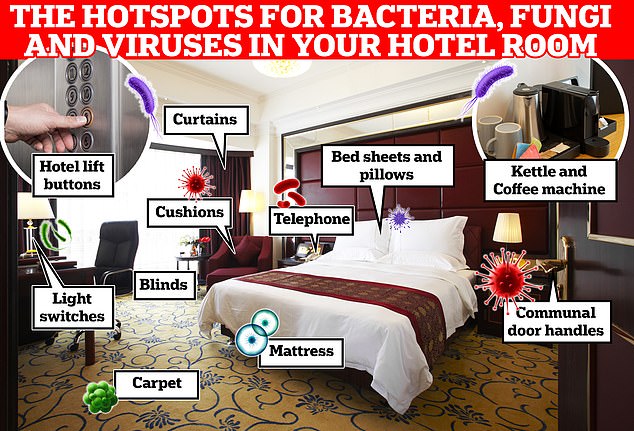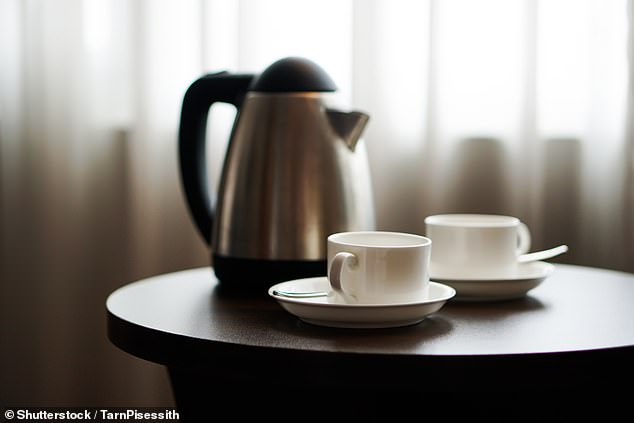A night in a hotel is something that many of us look forward to, but a new report could have you packing the cleaning spray alongside your flip flops.
Dr Primrose Freestone, a Senior Lecturer in Clinical Microbiology at the University of Leicester, has revealed the shocking truth about dirt and germs in hotel rooms.
Despite how they might look to the naked eye, hotel rooms can actually be filthy – regardless of how much you’ve forked out to stay there, according to Dr Freestone.
‘Whoever has stayed in your room prior to you will have deposited bacteria, fungi and viruses all over the furniture, carpets, curtains and surfaces,’ she explained in an article on The Conversation.
‘What remains of these germ deposits depends on how efficiently your room is cleaned by hotel staff.’

Despite how they might look to the naked eye, hotel rooms can actually be filthy – regardless of how much you’ve forked out to stay there, according to Dr Freestone

Before you’ve even reached your hotel room, you’ll be faced with a key hotspot for germs – the hotel lift buttons (stock image)
Before you’ve even reached your hotel room, you’ll be faced with a key hotspot for germs – the hotel lift buttons.
‘They are being pressed all the time by many different people, which can transfer microorganisms onto the button surface, as well back onto the presser’s fingers,’ Dr Freestone explained.
Communal door handles can harbour lots of germs, including nasty tummy bugs, respiratory viruses and even Covid-19.
‘Wash your hands or use a hand sanitiser after using a handle before you next touch your face or eat or drink,’ Dr Freestone advised.
While you might think of the toilet as a dirty spot, bathrooms actually tend to be cleaned more thoroughly, and are often the least bacteriologically colonised environments.
However, if the water cup isn’t disposable, Dr Freestone says it’s worth giving it a clean before using.
Bed sheets and pillows do tend to be changed between occupants, but the bedspread may not be.
‘These fabrics may become invisible reservoirs for pathogens – as much as a toilet seat,’ Dr Freestone said.
‘Soft fabric furnishings such as cushions, chairs, curtains and blinds are also difficult to clean and may not be sanitised other than to remove stains between guests.’
Devices included in your room such as the telephone, kettle and coffee machine can be handy, but their hard surfaces can also make them germ hotspots.
‘Viruses such as the norovirus can live in an infectious form for days on hard surfaces, as can COVID-19 – and the typical time interval between room changeovers is often less than 12 hours,’ Dr Freestone warned.

Devices included in your room such as the telephone, kettle and coffee machine can be handy, but their hard surfaces can also make them germ hotspots (stock image)
Meanwhile, bed bugs could be lurking everywhere from the mattress to the headboard.
‘These bloodsucking insects are experts at secreting themselves into narrow, small spaces, remaining dormant without feeding for months,’ Dr Freestone said.
‘Small spaces include the cracks and crevices of luggage, mattresses and bedding.’
Based on the findings, Dr Freestone advises washing and sanitising your hands regularly, and taking your own slippers or thick socks with you so you can avoid walking barefoot on the hotel carpet.
‘As higher-status hotels tend to have more frequent room usage, a more expensive room at a five-star hotel does not necessarily mean greater cleanliness, as room cleaning costs reduce profit margins,’ she concluded.
‘So wherever you’re staying, take with you a pack of antiseptic wipes and use them on the hard surfaces in your hotel room.’










